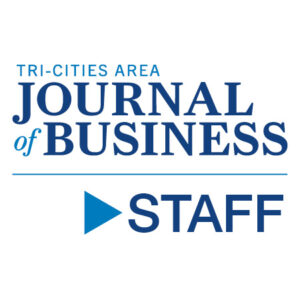
Home » Education & Training Briefs – September 2023
Education & Training Briefs – September 2023

September 14, 2023
New massage school to open next year in Richland
A new massage school is opening in Richland.
Advanced Bodywork Education (ABE) will begin offering evening courses in March 2024 and a day class option starting in September 2024 at 1901 George Washington Way.
ABE also will sponsor a student clinic beginning March 2024 for the benefit of both students and the public. It will give students the opportunity to work in real life situations with supervision from instructors and it allows the public to receive massage at a discounted rate.
Evening student clinic operates from September to March. Daytime student clinic operates from March to June.
ABE’s owners are Brenda Wiesner, director of education and curriculum, and Rebekah Norman, director of operations and logistics.
Go to: abemassageschool.com.
Pasco High’s new library offers unique check-outs
Pasco High School’s new Library of Things allows students to check out a diverse range of items beyond books to explore new interests, hobbies and careers.
The program, spearheaded by Pasco High School Librarian Elizabeth LeCompte, aims to enrich the educational experience of students.
Thanks to a $2,500 donation from Amazon, the Pasco School District put together a collection of more than 50 items from various categories, including arts and crafts, games, musical instruments, science and technology equipment, and outdoor sports and recreation gear.
Each item in the library is cataloged and barcoded, ensuring easy access for students eager to explore new interests.
For high school students unsure about their future career paths, the Library of Things can serve as a valuable resource by exposing students to various tools and equipment to help them discover a career they are passionate about.
“I think it’s pretty cool to check out a DJ set from school, especially the library,” said student Ismael, in a release from the district. “The library doesn’t always have to be just books.”
The Library of Things is designed to bridge the gap for students who may lack the means to explore their interests or potential career paths due to financial constraints.
CBC wins grant to help relieve student hunger
Columbia Basin College has been picked to participate in a new free and reduced-price meal pilot program aimed at helping college students stay in college and graduate.
The Pasco college is one of four community colleges in the state chosen for the program, along with Walla Walla Community College, Everett Community College and Grays Harbor College in Aberdeen.
The schools will receive up to $240,000 per year for three years to provide free and low-cost meal plans or food vouchers to eligible low-income students. The state Legislature established the pilot under House Bill 1559; the state Board for Community and Technical Colleges chose the recipients.
“It’s almost impossible to concentrate on studies when you’re worried about whether you’ll be able to eat that day,” said Jennifer Dellinger, student services policy associate for the state board, in a statement. “This pilot project will help students stay focused and graduate. We are grateful to the Legislature for recognizing that food and other living expenses are also educational expenses.”
CWU to help develop earthquake research center
Central Washington University is among a consortium of U.S. institutions involved in the development of a new earthquake research center that will be funded by a $15 million, five-year grant from the National Science Foundation.
The University of Oregon is leading the Cascadia Region Earthquake Science Center (CRESCENT) initiative, which will study the Cascadia subduction zone and bolster earthquake preparedness in the Pacific Northwest and beyond.
CRESCENT will be the first center of its kind in the nation focused on earthquakes at subduction zones, where one tectonic plate slides beneath another.
The center will unite scientists studying the possible impacts of a major earthquake along the Cascadia subduction zone, an offshore tectonic plate boundary that stretches more than 620 miles from southern British Columbia to northern California.
Among its key pillars, CRESCENT will advance earthquake research, foster community partnerships, and diversify and train the next generation geosciences workforce.
Additional institutions involved in the project include University of Washington, Western Washington University, Cal Poly Humboldt, Purdue University, Smith College, Stanford University, University of North Carolina – Wilmington, University of California, San Diego, Virginia Tech and the U.S. Geological Survey.
WSU study: Preschoolers show cultural differences in generosity
In a set of sharing experiments, Spanish-speaking Latino preschoolers were more likely to choose options that would be more generous to others, even over a more equal sharing choice.
Their English-speaking peers in the Washington State University study more often chose the most competitive option, one that advantaged themselves over others. The most competitive among that group were English-speaking Latino children, a finding that the researchers believe may reflect their desire to transition to the more individualistic American culture.
The WSU study not only adds evidence that children from collectivist cultures, which prioritize the good of the group over the individual, show those values early, but also helps distinguish their motivations.
“We knew that Spanish-speaking kids tended to be more cooperative, but we didn’t know whether that had to do with generosity or wanting things to be equal. Our work shows that they’re not more driven by equality. They’re just flat out more generous,” said Paul Strand, a WSU Tri-Cities psychologist and senior author of the study published in The Journal of Applied Developmental Psychology.
Strand, along with WSU graduate students Erinn Savage and Arianna Gonzales, ran a set of game-based experiments with 265 children ranging in age from 3 to 5 who were all enrolled in a Head Start preschool program. They used three “economic dictator games,” originally developed by Swiss and German researchers, which give children choices on keeping and giving items they liked.
Business Briefs Education & Training
KEYWORDS september 2023





